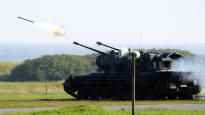Unlike many other countries, Germany has not helped Ukraine with heavy weapons. Chancellor Olaf Scholz has been criticized for being overly cautious.
In the midst of growing criticism, Germany has decided to supply Ukraine with heavy armaments.
German Ministry of Defense confirmed (switch to another service) on Tuesday, data show that Germany will supply Ukraine with about fifty Gepard anti-aircraft tanks.
Cheetah carriages are not state-of-the-art, but modernized 1960s war technology.
Cheetahs have a radar and two cannons. In addition to air defense, the carriages can be used in ground combat. Thanks to the radar, the carriage can also detect targets for other troops.
The German army acquired about 400 Cheetahs in its time. Some of them rest in the warehouses of the Bavarian arms manufacturer Krauss-Maffei Wegmann “in case of a bad day”, and wagons leaving for Ukraine are also delivered from there.
Delivery time has not been confirmed. According to the news agency AFP, the wagons must first undergo technical upgrades, as they were already decommissioned ten years ago.
Line change under pressure
The delivery of a few dozen wagons within weeks at the earliest will not reverse the course of the war, although it is an important addition to the fight against Russia.
More important is the fundamental significance of the decision. Chancellor Olaf Scholzin the government is now allowing, for the first time, the supply of heavy weapons to Ukraine.
This is a major line change, and more may be coming. Arms manufacturer Rheinmetall wants to supply one hundred Marder assault tanks to Ukraine, and the government has promised a quick decision.
The Slytherins were originally 1970s stock, almost as old as the Cheetahs. Older equipment is less efficient than new equipment, but on the other hand it can be put into service faster because training is simpler.
To date, Germany has armed Ukraine with anti-aircraft missiles, light bullets, mines, machine guns, ammunition and protective equipment, among others.
Many other countries have supplied Ukraine with combat armor, armored vehicles, helicopters and field cannons.
The harsh pressure around Scholz is easing, but no answers have yet been received
The decision eases pressure on Chancellor Scholz.
Other NATO countries and the German opposition parties, the CDU and CSU, have criticized the Scholz government for holding back, and criticism has even come from within the government. Foreign Minister, Greens Annalena Baerbock said (switch to another service) two weeks ago that Ukraine would need the most heavy armaments.
Scholz himself has given little justification for his line in public. Last week, however, Scholz said he would avoid making Germany a party to the war.
He has also argued that Germany needs to arm itself to meet its international obligations. This view has been at least partially disputed by military experts.
There has been speculation in public even with it (you switch to another service)is the president of Russia Vladimir Putin presented Scholz with some kind of direct threat that would have prevented him from acting. There is no evidence of this.
The scars of World War II are also suspected to be still reflected in German action. Germany has been passive in its defense policy in relation to the size of the country.
The Cheetah decision does not yet solve the “Scholz mystery,” which is what Germany really intends in its policy on Russia.
You can discuss the topic. The discussion is open on April 26. until 11 p.m.
